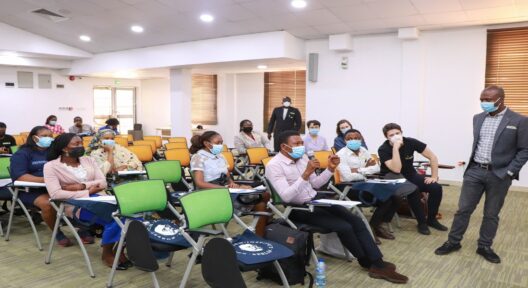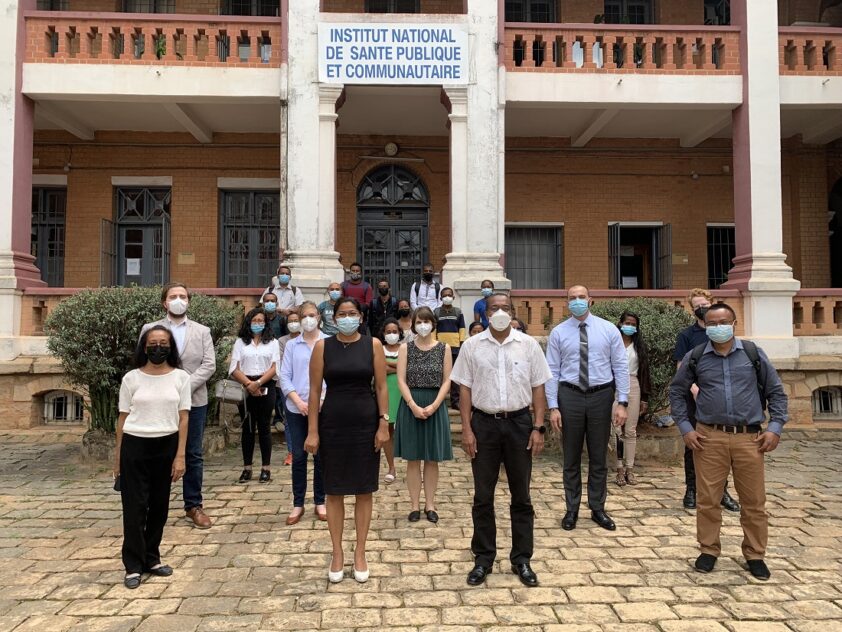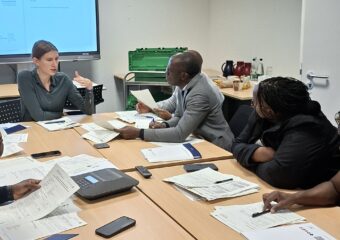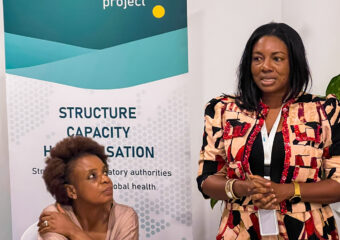BCHW-Trainings in African Partner Countries
In February 2022, four missions of Corona Global funded “Burden of COVID-19 among health care workers” (BCHW) took place. In Nigeria, Madagascar, Democratic Republic of Congo and Ivory Coast local study teams and data collectors participated jointly to a training on research methods and conducted a pilot study in preparation of the field work.

The COVID-19 pandemic has put health systems under considerable stress. Health care workers (HCW) are a critical part of the health system´s pandemic response and have been challenged both by high workload and high risk of exposure.
The BCHW project addresses these challenges: in a multisite international study between Robert Koch Institute (RKI) and partner institutions in Sub-Saharan Africa and Germany, to assess COVID-19 vaccine coverage and effectiveness, health care workers’ infection with SARS-CoV-2, risk factors for obtaining COVID-19, working experiences of health care workers and one-health implications.
The objective of the missions was two-fold. First, implementing a training on research methods with a focus on study-specific research tools and procedures. Second, to conduct a pilot study to test and optimize data collection tools and processes in preparation of the launch of fieldwork. The work was undertaken jointly with the local study teams and the data collectors in each partner country.
The RKI mission to Nigeria was held by colleagues form the Centre for International Health Protection (ZIG) of the RKI jointly with the partner institution of the study, the Nigeria Centre for Disease Control (NCDC). The research methods training focused on technical and processual aspects of interview-surveying, and the qualitative data collection approaches used in the study. The study was piloted at 100-beds hospital in Abuja, data collectors had the opportunity to pilot data collection under real-life conditions with actual health care workers.

In the RKI mission to Madagascar, the team focused on delivering a lab training and a research method training with specific focus on quantitative methods. The trainings took place at the Laboratoire d’Analyses médicales Malagasy (LA2M) and at the National Public Health Institute (NPHI), Antananarivo. After the training, the quantitative data collection tools were piloted at the Centre Hospitalier Universitaire Joseph Raseta Befelatanana and the Centre Hospitalier de Référence de District Itaosy in Antananarivo, and successfully adapted. The lab training focused on a practical training using Next Generation Sequencing (NGS) SARS-CoV-2 specific PCR methodology and serology methods. First sequencing runs were successful and the sequence analysis allows new insights of the SARS-CoV-2 variants in Madagascar.
During the RKI mission to the Democratic Republic of the Congo (DRC) joint study planning preparation including development of sampling strategy, review of study protocol and training documents and inventory of study supplies were carried out successfully. During a four-day training conducted jointly with the partners from the Institut National de Recherche Biomédicale (INRB), in Kikwit, Kwilu province competences on study protocol, research methods and laboratory analyses were strengthened. The pilot study took place in a local hospital. The one health approach was also piloted: veterinary colleagues of the field team took animal samples from the households and living environment of the study participants.
The RKI mission to Ivory Coast consisted of a week-long training on the study protocol, research methods and sample collection. In total, 47 participants composed of 13 field teams joined the training which took place at the Centre Hospitalier Universitaire Bouaké and was followed by a pilot of the data collection tools.
Date: July 2022



